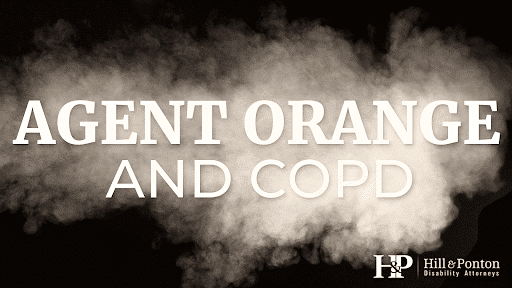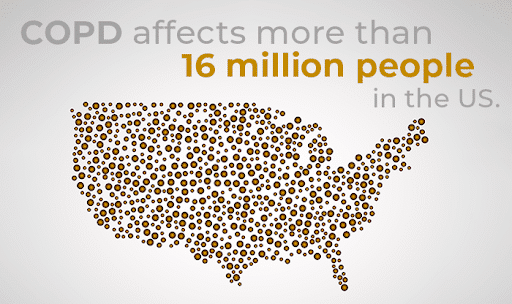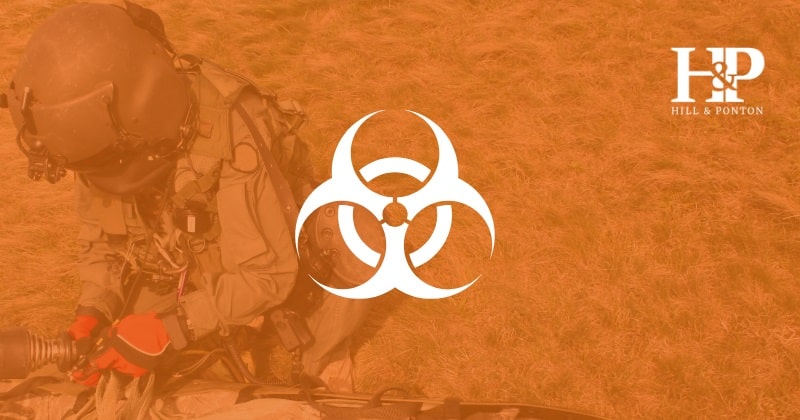Chronic Obstructive Pulmonary Disease (COPD) actually refers to a complex of respiratory diseases that cause lung blockage and breathing difficulties. As the disease progresses, patients lose more and more lung function. Examples include chronic bronchitis and emphysema. Whatever its specific form, COPD affects more than 16 million people in the United States. Additionally, millions of Americans have the condition but are going undiagnosed and are therefore not receiving treatment for their respiratory problems. According to the CDC, COPD is the third leading killer in the country, behind heart disease and cancer. In today’s blog, we discuss COPD, its potential relation to Agent Orange, VA benefits for COPD, and more.
There is no known cure, but several treatments may help slow the progression of COPD-related respiratory problems.
Symptoms of COPD
Symptoms of COPD and related respiratory conditions include shortness of breath, trouble taking a deep breath, and the inability to get enough oxygen. They may also include frequent coughing, wheezing and asthma-like symptoms, and excess phlegm and mucus production, which further clogs the lungs and restricts oxygen intake.
Causes of COPD
COPD is most frequently associated with chronic smoking. However, it’s also linked to workplace exposure to caustic chemical inhalation. About 15 percent of COPD sufferers can trace their conditions to workplace and environmental causes.
In a few cases, a genetic disorder called alpha-1-antitrypsin deficiency is to blame.
COPD and Agent Orange Exposure
Agent Orange was a widely-used defoliant employed to clear vegetation during the Vietnam War. The chemical included a powerful dioxin called 2,3,7,8-Tetrachlorodibenzo-p-dioxin, or TCDD, which the International Agency for Research on Cancer later classified as a carcinogen in humans.
Service members’ Agent Orange exposure is positively correlated with several forms of cancer skin disorders and other adverse health effects later in life. It’s also associated with several types of birth defects affecting the children of those exposed. In 1991, Congress passed the Agent Orange Act, which directed the National Academy of Sciences to investigate the connection of Agent Orange exposure on veterans later in life.
Scientists are still trying to determine whether Agent Orange and COPD are related due to the disease’s development later in life.

In 2012, Secretary of the Department of Veterans Affairs and retired General Eric Shinseki commissioned the Vietnam-Era Veterans Health Study, directing the Army Chemical Corps to investigate whether COPD and high blood pressure are related to Agent Orange exposure or to service in Vietnam more generally.
Researchers found that Vietnam veterans have a higher likelihood of reporting COPD than the general population. The VA itself admits as much in its own Patient Guide to COPD Management. The Army Chemical Corps Vietnam-Era Veterans Health Study (Cypel, et al.) found that veterans who were exposed to Agent Orange were more likely to have received a COPD diagnosis from their physicians. However, when researchers employed spirometry to test veterans’ airflow coming out of the lungs, they could not identify a strong correlation.
According to the Veterans Administration, the difference could be due to physicians relying on veterans’ descriptions of their own symptoms rather than employing spirometry or other objective measurements.
COPD is not among the diseases that qualify for a presumptive disability rating from the VA, even for Vietnam War veterans. The burden of proof is on the veteran to show that his or her COPD is service-related. However, veterans can still receive treatment for COPD through the VA health care system.
COPD Diagnosis
Doctors diagnose COPD in several ways: X-rays and CT scans can allow physicians to identify and diagnose emphysema. X-rays may also help rule out other possible diagnoses such as heart failure, respiratory cancer, or other lung conditions.
Spirometry and other Lung Capacity Tests
Your doctor may also conduct testing to identify how much air capacity you have. Most commonly, your physician may perform a spirometry test. This consists of having you blow into a tube, which measures how much air you can exhale and how fast you can blow it out.
Other tests include a six-minute walking test, lung volume measurement, diffusing capacity, and pulse oximetry.
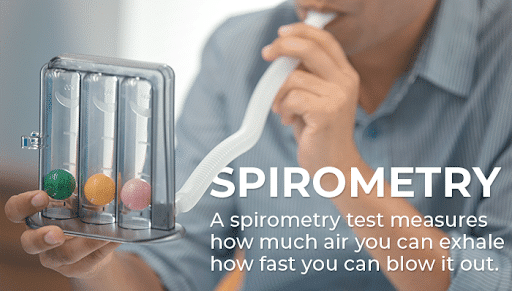
Arterial Blood Gas Analysis
Your doctor may order this test to identify how efficiently your lungs are transferring oxygen to your bloodstream, and how well they are removing carbon dioxide.
COPD Risk Factors
Smoking is the most significant risk factor for COPD by far. 85 to 90 percent of COPD cases are attributable to cigarette smoking.
Other risk factors include:
- Exposure to air pollution
- Secondhand smoke exposure
- Obesity
- Exposure to burn pits
- Dioxin exposure
- Defoliant exposure
Treatment for COPD
Your physician will work with you on developing a treatment plan for your COPD. Plans will vary based on the specific type of COPD you may have. COPD treatment goals may include:
- Slowing the progress of the disease;
- Improving and managing disease symptoms, to preserve your quality of life for as long as possible;
- Improve and maintain your tolerance for physical exertion, and;
- Prevent follow-on infections and complications.
Medications
There are three major families of medications that doctors may prescribe to help you control your COPD:
- Inhaled corticosteroids. These work over the long term to help reduce inflammation and swelling in the trachea and lung passageways. These are effective over days and weeks. Examples include beclomethasone and fluticasone.
- Beta-2 agonists. These medications help relax muscles surrounding small airway passages to increase airflow. They may be short-acting or long-acting. Short-acting medications work in a matter of minutes, while longer-acting Beta-2 agonists are effective in about 20 minutes. Effects for both last for a few hours. Albuterol is a common short-acting Beta-2 agonist and is often used in a “rescue inhaler” format. Levalbuterol is a longer-acting Beta-2 agonist.
- Antimuscarinics. These medications help prevent larger muscles from tightening around airways. Ipratropium and tiotropium are common medications used in inhalers under brand names such as Stiolto, Arnuity, and Trelegy.
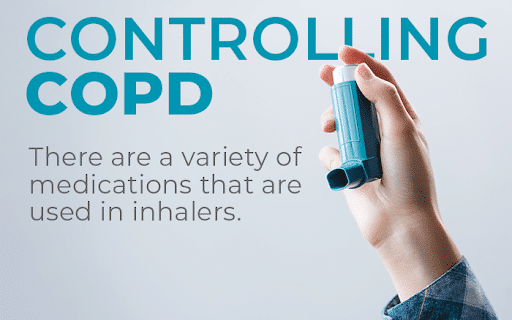
Other treatments
Oxygen.
As your disease progresses, you may need a portable oxygen tank, or even continuous oxygen, 24/7. The need for outpatient oxygen therapy may trigger a 100% disability rating within the VA system.
Breathing exercises.
Your doctor or physical/occupational therapist may also prescribe breathing exercises designed to expand your lungs and maximize oxygen throughput, to help you better manage your activities of daily living.
What you can do about your COPD.
- Stop smoking. First, if you’re smoking, stop. Continuing to smoke while suffering from COPD can cause the disease to progress much faster, resulting in a lower quality of life and an earlier death.
- Breathe cleaner air. Reduce your exposure to other lung irritants, such as secondhand smoke, allergens, pet dander, dust, household chemicals, and other air pollutants. These can cause irritation and inflammation of the bronchial passageways and worsen your condition.
If the air outside is smokey or polluted, stay indoors.
- Practice social distancing and good hygiene. The COVID-19 virus is much more lethal for those with COPD and other pre-existing conditions. Try to avoid crowds and other areas with a high risk of COVID transmission. Limit close contact with other people, and wash your hands regularly.
- Maintain a healthy weight. Your condition is likely to worsen if you are significantly overweight or underweight.
- Get your flu vaccine. The flu is much more dangerous for those with COPD than it is for the average population. However, it is generally safe to get the flu vaccine, even if you have COPD. Check with your doctor for any other contraindications before getting the injection, however.
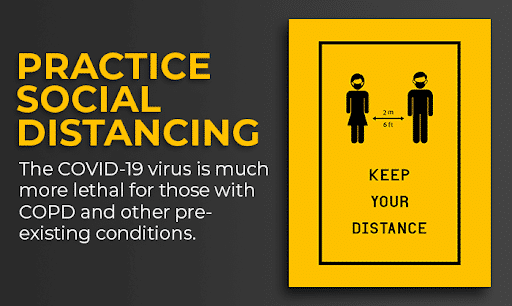
COPD VA Disability Benefits
If you are a veteran and you have service-related COPD, you may qualify for VA disability compensation. However, because COPD claims do not qualify for a presumptive disability rating, you will need to show VA claims officials that your COPD is service-related.
To do this, you’ll need to meet three qualifications:
- You must have a current diagnosis of COPD.
- You must document an event or symptom that occurred during your time in service, whether on active duty or while on reserve status. One example can be dioxin exposure, herbicide exposure, or prolonged proximity to a burn pit in Iraq or Afghanistan.
- You must show a medical nexus that connects your in-service incident or onset to your current COPD condition.
Note that you don’t need to have been actually diagnosed with COPD while you were in the service. You need only demonstrate that your current condition is a result of exposures or other incidents that occurred during your time in the military.
If you qualify for VA disability compensation, VA claims officials will assign a disability rating between 10 percent and 100 percent, depending on the severity of your condition. To qualify for a 100 percent disability rating, your VA examiner will have to assess your COPD as completely and permanently disabling.
VA Benefits for Bad Conduct, Dishonorable and Other Than Honorable Discharges
Veterans who receive a bad conduct or dishonorable discharge are not eligible for VA disability compensation. Those with other than honorable (OTH) discharges may or may not be disqualified, depending on the circumstances.
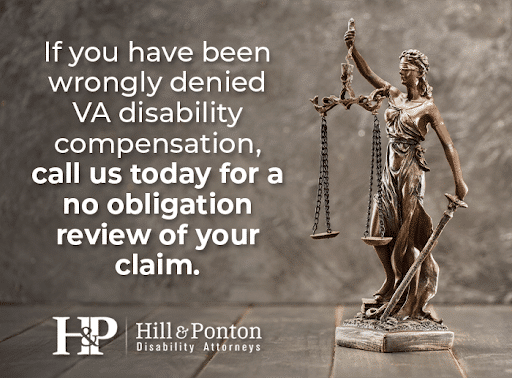
When to call a VA Disability Lawyer for your Agent Orange and COPD claim
VA disability claims are often wrongly denied, or rated too low. This is especially true of complicated medical conditions such as COPD. VA claims officials may wrongly deny that your condition is service-connected, for example. Or they may not apply the VA ratings rubrics correctly, resulting in a rating and monthly compensation that is hundreds or even thousands of dollars per month short of what you are entitled to.
If you believe you may have been wrongly denied VA disability compensation, call us today for a no obligation review of your potential claim. We may be able to help you successfully appeal your claim, and get you the compensation you deserve.
To schedule a no-obligation consultation and see if we may be a good fit for you, call us today at 888-249-4426.
